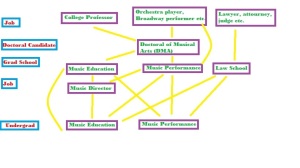The thought of going to college for an arts degree is a very foreign one for most people and a potentially frightening one if you are a parent of a child having such thoughts. But despite the perceived lack of opportunity – there are actually a number of different directions you can go when it comes to getting a bachelor’s degree in music.
First, if this situation does apply to you, understand that your parents probably aren’t anti-music so much as anti-things-they-don’t-know-about. Whenever I tell someone I’m majoring in Music Performance the typical response is something like “Oh that’s so cool!…..but what do you do with that?” – and your parents are probably having similar thoughts. People naturally fear what is alien to them, so the best thing we can do is to help them become familiar with it.
There are a number of career routes that are possible within the wide world of music – including music therapy, recording, composition etc….but for the sake of simplicity, we’re going to focus on the most common routes, which are the teaching and performance of music.
If you’re thinking about becoming a middle/high school music director, you can get a Bachelor’s Degree in Music Education, start student teaching your senior year of college, and if you’ve been doing your homework and working hard you will likely be able to earn a job your first year out of college. In my own experience, the best directors I’ve met also went on to get a Masters Degree, but a Bachelor’s in Music Education will certainly be enough to get a steady-paying job.
If you’d like to perform music, your route is a longer and more convoluted one – but there are still ways you can go for your dream and increase your financial security.
There are many people who double-major in Music Performance and Music Education, and the degree requirements are similar enough that you could finish both in four years, possibly five if you want to give yourself a lighter courseload. By exercising this double-major option, you can teach and make some money immediately after finishing your undergrad if you wish, or if you get a great scholarship to a great graduate program, you can go there and continue to study Music Performance. Many people also work as a music director for a few years, save money, and then go to grad school.
Another option is a double-major outside of music. This requires a heavier courseload and will likely take a little more than four years to finish, but I know some extraordinary people who are successfully doing it! Likewise, this gives you the option of getting a job right after your undergrad, or going straight into grad school.
If you decide to major only in Music Performance, you are a little less flexible with your options but there are still different routes you can go. First, understand that unless you’re a child prodigy who started at 5 years old or younger, you will have to get a Master’s Degree before winning a job in a well-paying orchestra. However, the good news is that if you work hard and get your practice in (3 hours per day according to the 10,000 hour rule), you can become a teacher’s assistant (TA) in grad school, and get most if not all of your costs covered by teaching lessons to undergrads and helping the faculty with other projects. The same goes for getting a doctorate. And once you have a doctorate, you can also go around interviewing for college faculty positions.
Another lesser known bit of info is that an undergrad music degree and high GPA from a respected university can also be a good way to get into law school.* I once had a horn professor mention that he had a few students do this. He said that when a “Music Performance” or “Music Education” applicant passes through admissions amongst a sea of people with “normal” undergrad degrees, it catches their eye. There’s plenty of financial stability to be had here! If finances are your (or your parents’) main concern, I don’t think there’s any issue to be had with a good lawyer’s salary!
To help you digest all that information, here’s a nice little flow chart (It’s not the most beautiful thing but it’s functional!) Please note that “street musician living out of a mini-van” is NOT found anywhere on the list!!!

Also, I did not include this on the chart – but if you happen to be religious you could also study music to become a church music director. Another viable career!
Back to our intro – If you’re a high school student and your parents don’t want you to major in music, I know you may feel lost. I know you may feel misunderstood – and hopefully this has helped you and your parents to understand exactly what you can do with your passion. But as much as you want your parents to understand where you’re coming from, you also need to understand where they’re coming from. Don’t fight them on whether you should major or music, but try to cooperatively review these options that are available to you, shed some light on the topic for them, and hopefully they’ll understand in due time. And in the meantime – go grab a practice room so you can win some scholarship money to help make it happen!!!
*Though I believe the same rule may apply for getting into medical school, I don’t know anyone personally who’s done it and haven’t researched it enough. However, that may be a viable option as well!